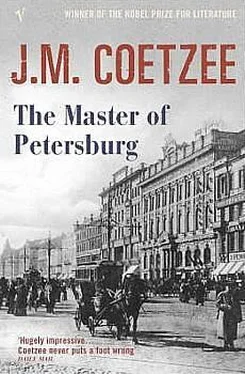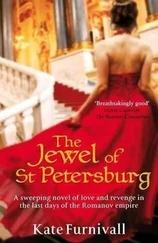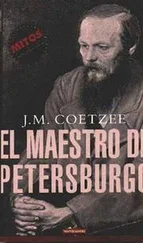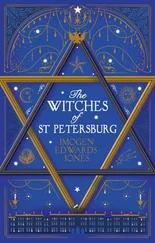The official regards him sardonically. 'A nonentity -is that your Christian word on him?'
At this moment Maximov himself enters in a great hurry. Under his arm is a pile of folders tied with pink ribbons. He drops these on the desk, takes out a handkerchief, and wipes his brow. 'So hot in here!' he murmurs; and then, to his colleague: 'Thank you. You have finished?'
Without a word the man gathers up his papers and leaves. Sighing, mopping his face, Maximov takes over the chair. 'So sorry, Fyodor Mikhailovich. Now: the matter of your stepson's papers. I am afraid we are going to have to keep back one item, namely the list of people to be, as our friends say, liquidated, which – I am sure you will agree – should not go into circulation, since it will only cause alarm. Besides, it will in due course form part of the case against Nechaev. As for the rest of the papers, they are yours, we have finished with them, we have, so to speak, extracted their honey from them.
'However, before I pass them over to you for good, there is one thing further I would like to say, if you will do me the honour of hearing me out.
'If I thought of myself merely as a functionary whose path of duty you have happened to cross, I would return these papers to you without more ado. But in the present case I am not a mere functionary. I am also, if you will permit me to use the word, a well-wisher, someone with your best interests at heart. And as such I have a severe reservation about handing them over. Let me state that reservation. It is that painful discoveries lie in store for you – painful and unnecessary discoveries. If it were possible that you could bring yourself to accept my humble guidance, I could indicate particular pages it would be better for you not to dwell on. But of course, knowing you as I do, that is, in the way one knows a writer from his books, that is to say, in an intimate yet limited way, I expect that my efforts would have only the contrary effect – of whetting your curiolity. Therefore let me say only the following: do not blame me for having read these papers – that is after all the responsibility laid on me by the Crown – and do not be angry with me for having correctly foreseen (if indeed I have) your response to them. Unless there is a surprising turn of events, you and I will have no further dealings. There is no reason why you should not tell yourself that I have ceased to exist, in the same way that a character in a book can be said to cease to exist as soon as the book is closed. For my part, you may be assured my lips are sealed. No one will hear a word from me about this sad episode.'
So saying, Maximov, using only the middle finger of his right hand, prods the folder across the desk, the surprisingly thick folder that holds Pavel's papers.
He rises, takes the folder, makes his bow, and is preparing to leave when Maximov speaks again. 'If I may detain you a moment longer in a somewhat different regard: you have not by any chance had contact with the Nechaev gang here in Petersburg, have you?'
Ivanov! Nechaev! So that is the reason why he has been called in! Pavel, the papers, Maximov's dance of compunctiousness – nothing but a side-issue, a lure!
'I do not see the bearing of your question,' he replies stiffly. 'I do not see by what right you ask or expect me to answer.'
'By no right at all! Set your mind at rest – you are accused of nothing. Simply a question. As for its bearing, I would not have thought that so difficult to work out. Having discussed your stepson with me, I reasoned, perhaps you would now find it easier to discuss Nechaev. For in our conversation the other day it seemed to me that what you chose to say sometimes had a double meaning. A word had another word hidden beneath it, so to speak. What do you think? Was I wrong?'
'Which words? What lay beneath them?'
'That is for you to say.'
'You are wrong. I do not speak in riddles. Every word I use means what it says. Pavel is Pavel, not Nechaev.'
With that he turns and takes his departure; nor does Maximov call him back.
Through the winding streets of the Moskovskaya quarter he bears the folder to Svechnoi Street, to No. 63, up the stairs to the third floor, to his room, and closes the door.
He unties the ribbon. His heart is hammering unpleasandy. That there is something unsavoury in his haste he cannot deny. It is as if he has been conveyed back to boyhood, to the long, sweaty afternoons in his friend Albert's bedroom poring over books filched from Albert's uncle's shelves. The same terror of being caught red-handed (a terror delicious in itself), the same passionate engrossment.
He remembers Albert showing him two flies in the act of copulating, the male riding on the female's back. Albert held the flies in his cupped hand. 'Watch,' he said. He pinched one of the male's wings between his fingertips and tugged lightly. The wing came off. The fly paid no attention. He tore off the second wing. The fly, with its strange, bald back, went on with its business. With an expression of distaste, Albert flung the couple to the ground and crushed it.
He could imagine staring into the fly's eyes while its wings were being torn off: he was sure it would not blink; perhaps it would not even see him. It was as though, for the duration of the act, its soul went into the female. The thought had made him shudder; it had made him want to annihilate every fly on earth.
A childish response to an act he did not understand, an act he feared because everyone around him, whispering, grinning, seemed to hint that he too, one day, would be required to perform it. 'I won't, I won't!' the child wants to pant. 'Won't what?' reply the watchers, all of a sudden wide-eyed, nonplussed – 'Goodness, what is this strange child talking about?'
The folder contains a leather-bound diary, five school exercise books, twenty or twenty-five loose pages pinned together, a packet of letters tied with string, and some printed pamphlets: feuilletons of texts by Blanqui and Ishutin, an essay by Pisarev. The odd item is Cicero 's De Officiis, extracts with French translation. He pages through it. On the last page, in a handwriting he does not recognize, he comes upon two inscriptions: Salus populi suprema lex esto, and below it, in fighter ink, Talis pater qualis filius.
A message, messages; but from whom to whom?
He takes up the diary and, without reading, ruffles through it like a deck of cards. The second half is empty. Still, the body of writing in it is substantial. He glances at the first date. 29 June 1866, Pavel's name-day. The diary must have been a gift. A gift from whom? He cannot recall. 1866 stands out only as the year of Anya, the year when he met and fell in love with his wife-to-be. 1866 was a year in which Pavel was ignored.
As if touching a hot dish, alert, ready to recoil, he begins to read the first entry. A recital, and a somewhat laboured one at that, of how Pavel spent the day. The work of a novice diarist. No accusations, no denunciations. With relief he closes the book. When I am in Dresden, he promises himself, when I have time, I will read the whole of it.
As for the letters, all are from himself. He opens the most recent, the last before Pavel's death. 'I am sending Apollon Grigorevich fifty roubles,' he reads. 'It is all we can afford at present. Please do not press A.G. for more. You must learn to live within your means.'
His last words to Pavel, and what petty-minded words! And this is what Maximov saw! No wonder he warned against reading! How ignominious! He would like to burn the letter, to erase it from history.
He searches out the story from which Maximov read aloud to him. Maximov was right: as a character, Sergei, its young hero, deported to Siberia for leading a student uprising, is a failure. But the story goes on longer than Maximov had led him to believe. For days after the wicked landowner has been slain, Sergei and his Marfa flee the soldiers, sheltering in barns and byres, abetted by peasants who hide them and feed them and meet their pursuers' questions with blank stupidity. At first they sleep side by side in chaste comradeship; but love grows up between them, a love rendered not without feeling, not without conviction. Pavel is clearly working up to a scene of passion. There is a page, heavily crossed out, in which Sergei confesses to Marfa, in ardent juvenile fashion, that she has become more to him than a companion in the struggle, that she has captured his heart; in its place there is a much more interesting sequence in which he confides to her the story of his lonely childhood without brothers and sisters, his youthful clumsiness with women. The sequence ends with Marfa stammering her own confession of love. 'You may… You may…' she says.
Читать дальше












